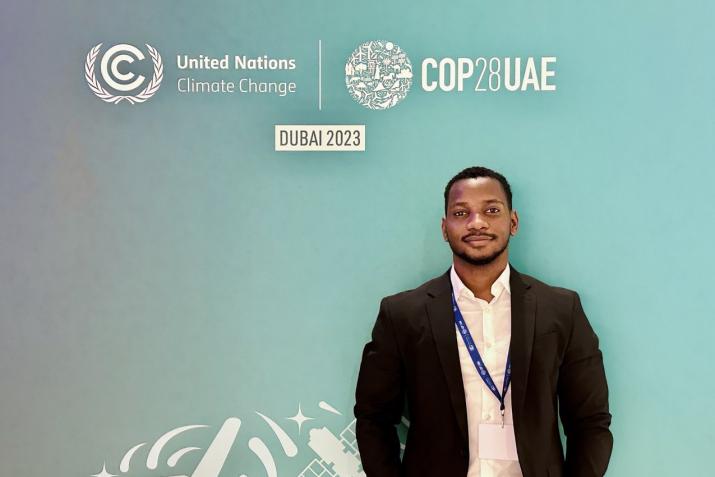For the first time, the United Nations’ annual conference on climate change includes a focus on health. And that makes it especially interesting to global health students like Kalipa Gedion
Gedion, a student in DGHI’s Master of Science in Global Health program, is among a small delegation of Duke University experts and students at the high-profile event in Dubai, known as the 28th Conference of Parties (COP28). A native of Tanzania, Gedion is attending the two-week event, which runs from Nov. 28-Dec. 12, to soak up conversations on the latest climate research and policy. When we reached him in Dubai, he had just attended sessions on the conference’s first-ever Health Day, which took place on Dec. 3.
“The climate crisis has become a health crisis,” Gedion wrote in an email. “There’s a significant gap where researchers can’t accurately measure how these factors influence health outcomes. If we cannot measure, how can we develop effective solutions?”
Gedion, who earned his medical degree from Tanzania’s Hubert Kairuki Memorial University, is studying factors driving the high 30-day mortality rate among heart attack patients in his native country. He says attending COP28 will not only help him understand the role of climate in such health outcomes, but advance his goal of becoming a voice for climate justice for countries like Tanzania, that have done little to cause climate change but are among the first to feel its effects.
“I strive to increase advocacy in the role of health professionals within the climate space,” he wrote.
Here is an edited version of DGHI’s email conversation with Gedion about his COP28 experience.
What else will you be doing during COP28?
I am working with three clients: the United Republic of Tanzania, the Global Climate and Health Alliance and RTI International. My primary focus is the intersection of climate and health. I’ll follow up on negotiations on different themes of climate action, daily meetings, party outreach/advocacy, and write blogs.
Dec. 3 marked the first-ever Human Health Day. How was that experience?
Health Day was my highlight of COP28. It was a fine opportunity to network with other like-minded health workers and witness their climate/health research and interventions. More than 70 health minister representatives were in attendance and agreed on the urgency of seeking solutions to protect people’s health from climate change. There was increased funding from various governments and philanthropists for global climate health. I think health is here to stay at the conference.
Tell us about the conversations you’ve been a part of or have heard so far.
COP can be quite overwhelming with the sessions, agendas, interests, etc., all acting concurrently. There has been strong support for emphasis on health in the climate space from 127 countries. While this is tremendous news, the only concern is the action to implement these pledges and health commitments, and not just create text in documents.
Why is action needed on climate change regarding people’s health?
We are seeing poor health outcomes from climate phenomena, which continues to increase. There has been an emergence of zoonotic diseases in unexpected locations, an increase in cardiovascular and respiratory morbidity from air pollution and a discontinuation of health services when people migrate from natural disasters. We will regress from progress already made in global health if we don’t intervene immediately. Health workers, organizations and researchers have a role to play in protecting the communities they serve.
What are you hoping to take away from this experience?
I want to be a climate health specialist, and it’s a field imperative to improve human health. I want to be well-versed in climate-related factors so I can co-develop effective interventions to reduce the mortality rate of heart attack patients in Northern Tanzania. I want to create interventions that are adaptable in other settings and countries.
It will be a privilege to influence other health workers to engage in this space. I want to continue advocating for breaking the colonial tendencies of harming low- and middle-income countries (LMICs) most affected by global warming. LMICs contribute to less than one percent of the global greenhouse gas emissions compared to high-income countries. I want to continue being a voice for climate justice.



